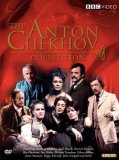| Reviews & Columns |
|
Reviews DVD TV on DVD Blu-ray 4K UHD International DVDs In Theaters Reviews by Studio Video Games Features Collector Series DVDs Easter Egg Database Interviews DVD Talk Radio Feature Articles Columns Anime Talk DVD Savant Horror DVDs The M.O.D. Squad Art House HD Talk Silent DVD
|
DVD Talk Forum |
|
|
| Resources |
|
DVD Price Search Customer Service #'s RCE Info Links |
|
Columns
|
|
|
Anton Chekhov Collection, The
THE SHOW:
The BBC archives are a treasure trove of material waiting to be rediscovered. Amongst them are many filmed versions of classic plays starring some of the best actors to ever tread the boards. With many of them filmed live on elaborate sets, they maintain the look and feel of stage productions while also hearkening back to the old days of live television. The six-DVD Anton Chekhov Collection gathers up vintage stagings of the master playwright's dramatic material, providing a mini-education in the Russian author's bibliography in one handy box. These aren't necessarily cinematic productions, but a glimpse of what it would be like to have seen marvelous British theatre actors at work; though, don't make the mistake of thinking these are static or confined teleplays. All of the sets are designed to go beyond the confines of the stage, so that the actors can move freely in and out and the cameras can go with them. Others break from the form and also take the camera outside.
Most of the long-form productions are taken from the "Play of the Month" television program in the early 1970s. Others either predate this series, while two plays get double doses, including one more modern version of each.
Disc 1
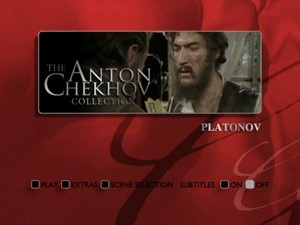
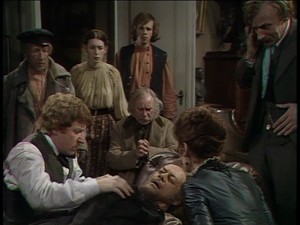
* Platonov leads the set. This production of Chekhov's first full-length play was filmed in 1971 for the "Play of the Month" series. It stars Rex Harrison (My Fair Lady, Dr. Dolittle) as the title character, a disgraced scholar who has been demoted to the position of schoolmaster in a provincial Russian town. An infamous rapscallion with an acid tongue, Platonov is both the toast of his new home and its scourge. His wit may make you laugh, but only if it isn't aimed in your direction.
Chekhov's darkly comic tale picks up on the night of a grand celebration, with many of the town luminaries and eccentrics gathered at the house of the widowed Madame de General, Anna (Sian Phillips). The party is populated with the upper class, but not all of the same class are created equal, and there are petty squabbles and judgments amongst the group, including disdain for the working rich and the lone Jewish attendee. Amongst the guests is Sofia (Joanna Dunham), newly married to Anna's stepson (Geoffrey Bayldon) and a former student of Platonov's, though it seems they had more than a common student-teacher relationship. Before the night is through, Platonov is entangled in affairs with Anna, Sofia, and even a contentious entanglement with another of his students whom he has offended (Bridget Armstrong). All whilst ignoring the wife (Patsy Byrne) and baby he has at home.
The first act of Platonov is concerned with the social comedy that arises from the mismatched group, while the second act plunges Platonov deeper into his own lust, which he must attempt to then crawl out of in the third act. Rex Harrison naturally has the meatiest role, and he plays it for all its worth, from fast-talking cad to drunken lothario to the completely broken man Platonov has become. There are a ton of characters, so sometimes it's hard to keep names straight, and some of the make-up on the male actors probably looked better from the distance of a stage than it does in close-up, but this is an excellent production of an expertly constructed tale, full of the right humor and pathos, and a strong introduction to the Chekhov milieu.
Disc 2
The second disc has three plays: one full-length production (The Wood Demon, clocking in at 1 hour, 45 minutes) and two shorter one-act plays (about half an hour).
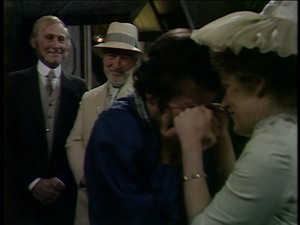
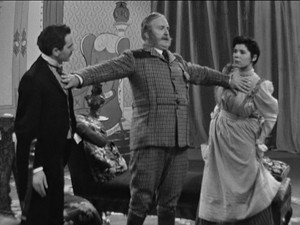
* The Wood Demon is a 1974 staging of an early version of Chekhov's Uncle Vanya. It stars a young Ian Holm as the play's title character, a country doctor and proto-conservationist concerned with preserving the natural Russian forests. As with Platonov, Chekhov establishes his rather large cast by opening at a social gathering, the birthday party of a local merchant. Several families converge, including an aged professor (Anthony Douse) who brings along his daughter from his first marriage, Sonya (Vickery Turner), and his second wife Helen (Francesca Annis). Sonya has eyes for the Wood Demon, but he is at odds with her Uncle George (Ronald Hines) and, well, just about everyone, in regards to his environmental causes. Helen is intrigued by the doctor's ideas, even as she must rebuke George's advances and that of the town rake, Theo (Donal McCann).
Chekhov constructs his complicated love affairs along class lines, so that various suitors and their desired lovers are often at different social levels. The professor is one of the more respected men of the town, though Theodore is actually in line to be the richest. The Wood Demon fancies himself above such things, though truthfully, his own self-importance has made him rather ignorant of social graces. Holm plays him as a man constantly distracted, prone to proselytizing and angry outbursts, blind to the hurt he inflicts. If anyone is aware of the ridiculous mores of their social group, it's the women, particularly the bored Helen (Annis is quite good, at turns aloof, distraught, and then compassionate) or the outré Julia (Angela Pleasence). Lots of drawing room conversations cause the complications to grow out of proportion, prompting rash actions. Chekhov makes many good points about the way a family destroys itself from within much in the same way his characters do what they will with the land without ever thinking about how this might affect the future, making the playwright somewhat of a visionary; however, The Wood Demon loses some of its sharpness in its final scenes, with too many reconciliations and a happy tone that sits uneasily next to some of the heavier subjects the text has flirted with.
* The Proposal is an early 1960s production, and it's a more stylized staging than the more realistic looking "Play of the Month" material. Shot in black-and-white on an actual stage set, including flat, painted backgrounds, the one-act, three-character play involves young farming aristocrat Lomov (Harry Moore) asking his neighbor's daughter Natalyia (Anne Robson) to marry him. The tract of land between the two properties, however, becomes a point of argument between the two would-be spouses, as does pride over whose dog is a better retriever, and the two stubbornly argue their ground. It's an amusing take on the "business" of love. The English translation is quite good, with Natalyia's father (David Bird) having several wonderful stuffy turns of phrase.
* A Wedding from 1962 could easily be the sequel to The Proposal; in fact, Anne Robson returns as the bride in this one, too. Set at the matrimonial reception, Chekhov makes comedy out of the foibles and the petty squabbles amongst the guests.
Disc 3
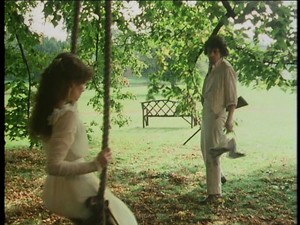
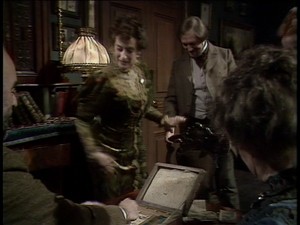
* The Seagull is a 1978 episode of "Play of the Month" tackling one of Chekhov's signature pieces. Directed by Michael Lindsay-Hogg, who also helmed the infamous happening The Rolling Stones Rock 'n' Roll Circus and later the John Malkovich/Andie MacDowell vehicle The Object of Beauty, it's the first in the set to break out of the prefab constructs, and the first half of the movie takes place outside and is shot on location. The play is another grand social drama, working across generations to explore the creative process and how it affects one's humor and one's ability to love. Youth vs. age, passion vs. safety, actions vs. words.
The Crying Game's Stephen Rea plays Constantin, a moody young man who wants to be a great writer. He seeks the approval of his mother (Zoe Caldwell), a famous actress, who aggravates her son with her self-absorption and damages his Oedipal ego by shacking up with Trigorin (Michael Gambon, Layer Cake), a successful author with mediocre skills. Constantin loves Nina (Julia Schofield), an actress he has cast in the play he seeks to put on during the family vacation in the country, but Nina has stars in her eyes and not only chases, but catches Trigorin. Thus, Constantin is like a double cuckold to Trigorin, and his own self-involvement (he learned well from dear ol' mummy) makes him blind to the love of the cynically romantic Masha (Georgina Hale, who can knock a vodka back with the best of them).
There is much heart-rending to be had, with Constantin's dramatic gestures first causing a seagull to lose his life and then the boy to try to take his own before the drama jumps ahead two years and all of these trysts and entanglements must be answered for. Rea is solidly charismatic as the sub-Byronic hero, and Gambon is subtle and slippery as the opportunistic writer. I found Chekhov's ruminations on the creative impulse absorbing, and that these BBC productions put a heavier weight on the words than they do filmic language pays off in a case like this, where the chattiness really drives the narrative.
Disc 4
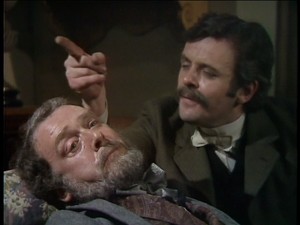
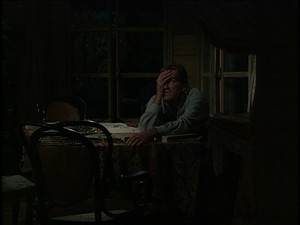
* Uncle Vanya is one of Chekhov's most famous plays and thus one that is produced the most often out of his library. In this set, we get two full productions on a double-sided disc, a 1970 film on Side A and a 1991 version on Side B. The play itself is an update of The Wood Demon, and that early effort has matured with Chekhov's skills. This remake is more sophisticated, with Chekhov trimming out a few characters and dropping some of the more strident, overwrought politics. The men in the play now feel the weariness of age, and as such, they no longer can subscribe to unbendable beliefs. They have felt the sting of failure, and they are aware of their own history. Alcohol also plays a more important role in their misery, much as it does in Platonov.
The Vanya character now takes the place of Uncle George, and he is a middle-aged man with nothing to call his own, no mark of distinction, resentful of his dead sister's husband, in love with the old man's new wife. Vanya in the 1970 version is played with inebriated bitterness by Freddie Jones. It's a stagey performance, with the actor bellowing and gesticulating wildly at times, and at others dropping to an overtly poetic whisper. It's hard to tell if he's intentionally pretentious, playing Vanya as a sort of soulless poser. Jones certainly is no competition for Anthony Hopkins, who plays his friend, the doctor Astrov, the new version of the Wood Demon. He's still an environmentalist, as well as a vegetarian, but he is now a drunk and far more aware of his own outsider status and not as convinced that he can change the minds of others. His cynicism has made him a realist. Hopkins shows greater restraint than Jones, his sadness more soulful, wearing it like a heavy shirt. There is a dichotomy created between the two, a gulf of real feeling that Jones ends up traversing due to his character's more ignominious end, his drama queen status made all the more tragic by his inability to do anything to stop his own sufferring.
The 1991 staging (for a series called "Performance"), interestingly enough, brings back Ian Holm as Astrov. The more mature actor taking on the more mature version of the role he played on DVD 2. The whole cast is slightly more "all-star," with Rebecca Pidgeon (known from countless David Mamet roles) playing the niece Sonya and Mary Elizabeth Mastrontonio (The Abyss) as her stepmother, Yelena. David Warner, perhaps best known as Billy Zane's ruthless right-hand man in Titanic, takes on Vanya.
The shooting style for this much later production is essentially the same as on the others, though the picture quality is noticeably better. The biggest difference is that the histrionics have been toned down in this Vanya and the performances grounded in a more weary reality. Holm and Hopkins take similar approaches, though Holm plays the doctor as far less arrogant. Warner's Vanya is a vast improvement, much less soppy, more aware of his bitterness and all that he feels he has lost. He has as much anger as he does self-pity.
Disc 5
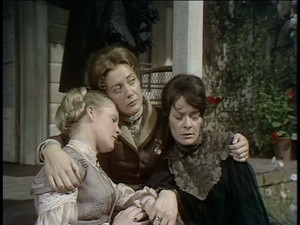
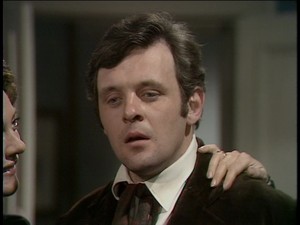
* The Three Sisters, staged by "Play of the Month" in 1970, contains all the emergent themes of the previous plays, but with an sense of increasing fatalism. The rather large cast is wrangled into the family home of the titular siblings: the eldest, a practical spinster named Olga (Eileen Atkins); the dark, cynical middle sister, Masha (Janet Suzman), with her raven-feathered hat and funereal attire; and the youngest sister, the hopeful, fair-haired Irina (Michelle Dotrice). The story opens on Irina's 20th birthday, adding extra activity to the house, already a nexus of social interaction in the town. Lodgers, suitors, and husbands all attend the festivities. There is also the brooding presence of Andrei (Anthony Hopkins), the brother to the three sisters and another of Chekhov's men laboring under an artistic cloud.
Over each successive act break, Chekhov moves the story forward in time, advancing the family and their friends in age and further from the false promises of their dreams. The loss of memory is a recurrent theme, suffered by the youngest, Irina, and the oldest, the doctor (Joss Ackland), alike. Memory loss is equal to the abandonment of dreams, be they the sisters and their longing to move to Moscow or the acceptance of one's fate in love. Masha has started an affair with a Colonel (Michael Bryant) she met as a child, but both are stuck in marriages that make them unhappy. The Colonel, and to a certain extent the doctor, are the main voices for the play's bleak outlook. There is an ever-present concern with the future, that the toil of today is only for the benefit of generations to come, and none of them should expect happiness in their lifetime. The one person who does not agree with this thesis, who instead believes that things are as they ever were and as they always shall be so be happy with it, is the Baron (Ronald Hines). Naturally, his fate is to be stamped down, his punishment to inspire the epitaph, "What different does it make?"
Though I suppose it's better than the boredom that persists in the lives of the others. They are all forced to go on, which may be the cruelest thing that Chekhov, as a writer, can inflict on his characters.
Disc 6
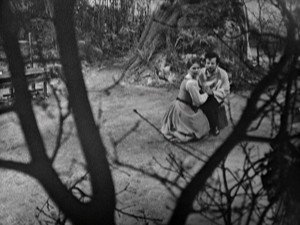
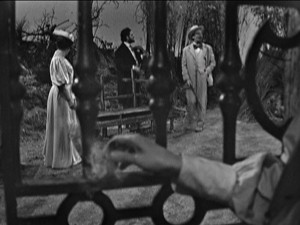
* The Cherry Orchard rounding out the boxed set is not just fitting because it's the last play Chekhov wrote, but because it also is a summation of all the themes of his earlier stage productions. As with Uncle Vanya, there are two version of this piece, one on each side of a double-sided DVD.
The first is a production from 1962 adapted by John Gielgud and directed by Michael Elliott and Michel Saint-Denis. It also stars Gielgud as the family patriarch, Gaev, and Peggy Ashcroft (Sunday Bloody Sunday) as Madame Ranevsky. A very young Judi Dench plays their head-in-the-clouds daughter, Anya, and in his earliest performance of the set, Ian Holm is Trofimov. This character is not only Anya's love interest, but as an adult student, he is another of Chekhov's thinking environmentalists. His vision of a future where humanity and the natural world will find some harmony is contrasted against the plight of Gaev and Ranevsky. Having returned from a trip, they are told they must sell their family orchard in order to pay their debts, a situation they face with a stiff upper lip that looks a lot like denial. This subplot lends a nostalgia to the script, as Chekhov is examining the passing of an age. Class distinctions are clearly drawn, with an almost upstairs-downstairs structuring that cuts back and forth between the servant class and the landowners, a line that will be erased as the play goes on.
Nearly twenty years later, in 1981, the BBC remade The Cherry Orchard with Judi Dench, this time as Madame Ranevsky and teaming her with director Richard Eyre, who would later work with the great actress in the excellent Notes on a Scandal. The biggest difference between the two productions is that the later color version is much more lavish, with more elaborate sets and costumes. Dench gives Ranevsky a more regal bearing, whereas Ashcroft played her as more outdated and silly. This gives rise to a greater gulf between those who realize change is coming and those who continue partying as if nothing will ever derail their way of life.
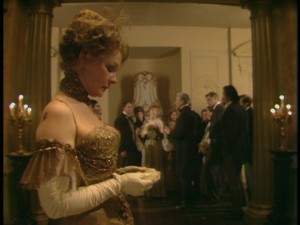
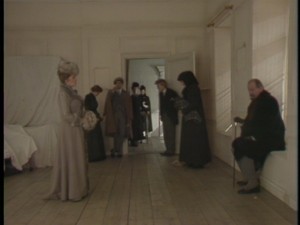 å
å
THE DVD
Video:
These productions were shot for television in decades past, possibly on video, and sometimes that shows in the way the sets are lit. The picture is full screen with a 4:3 aspect ration. The quality of each disc depends on the source material, and some of the programs have fared better than others. The worst comes with a warning, appearing on DVD 1 before the start of Platonov, and it essentially cops to this, letting the home viewer know that some of the materials were damaged beyond repair, indicating a particularly obvious part at the 13-minute mark that looks like it had been chewed on by a VCR at some point. On the opposite end of the spectrum, the 1991 Uncle Vanya suffers from some image stuttering, small moments where the picture appears to pause and repeat itself.
The black-and-white The Proposal on DVD 2 is another with more noticeable problems, with ghosting and some pixilated tracers when the characters move swiftly. Worse, though, is A Wedding, which has consistent digitizing through the whole half-hour program. It looks like something you'd watch on YouTube.
As you will see with most 1970s and '80s BBC programs, there is a vast difference in the look of shows shot on location and those shot in the studio. Thus, with a movie like The Seagull, the outdoors scenes are noticeably less sterile than the interior, and the image takes on quite a bit of grain and softer resolution.
The black-and-white 1961 Cherry Orchard looks a bit like a kinetoscope recording in that there appears to be a glass layer between the TV screen and the image. That glass was in need of a good wipedown, as there are regular, unmoving spots throughout. You will also see some fuzzy edges that reveal the picture's age.
For the most part, though, other than these exceptions mentioned, the video quality is fairly good, without a lot of dirt or surface wear. Colors are a little muted, but that is also likely a fault of the production; blacks are rarely very deep, but most of the films are lit rather starkly anyhow. Any faults seem to fit the spirit of the production, and are neither distracting nor unacceptable. Only some digital combing is evidence of the transfer of material from an antiquated medium to a more modern one.
Sound:
The Anton Chekhov Collection is working with original monaural mixes made for television broadcast, and so there are no fancy audio tracks here. In fact, the sound is quite obviously recorded live, and you can hear different levels sometimes based on the position of the actor on the set. Like with the video, though, this is part of the nature of the productions, of capturing plays as they were rather than actual movies of plays, and so it makes sense that this quality would be preserved.
A Wedding is by far the worst of the audio productions here, with a loud hiss marring the first couple of minutes of the program. Though it becomes less pronounced as the play goes on, it does stick around.
The DVDs all have optional English subtitles geared toward the deaf and hearing impaired.
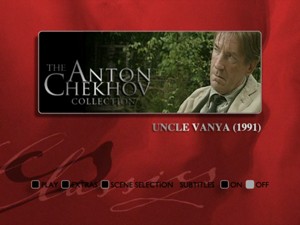
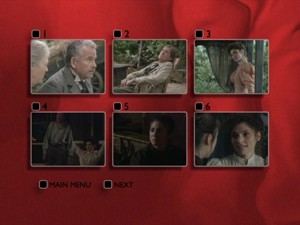
Extras:
The six DVDs have individual extras, all of which relate to Anton Chekhov.
DVD 1 has two bonus features. First is a 28-minute, 1984 segment from the BBC program "Omnibus" profiling actor Michael Pennington and his one-man stage show where he played Anton Chekhov. The second bonus is a two-hour radio version of Chekhov's Wild Honey, an alternate title for the disc's main feature, Platonov. In this version, Platonov is played by none other than Sir Ian McKellen. This production, adapted by Michael Frayn, is also from 1984 and was performed on stage in London with the same cast.
DVD 2 has two more radio plays: "Ivanov" starring Ralph Fiennes and "Swan Song."
DVD 3 shakes up the bonus section a little. The audio is a program called "Disappointment," and it's a series of five short stories read by Ewan McGregor. They include: "His Wife," "The Bet," The Beauties," "Concerning Love," and "Vanka." In addition to the audio is a 40-minute short film called "Artist's Story," and I guess it was made a bonus instead of a second feature since it's based on a Chekhov prose work rather than a play. Presumably from the 1970s, it stars Patrick Stewart as Orloff, a painter who is caught between two sisters, one who fancies the artist's life and one who is a crusader for the poor. He is also caught between his own idle concerns and the hard labor of his farming friend, and the story involves much debate about these social conditions.
There are no extras on side A of DVD 4, but Side B has a 50-minute television program called "Bookmark," and the episode is titled "A Visit from Vanya." The segment is about a director from the Moscow Arts Theatre visiting Oxford and conducting a Chekhov workshop.
DVD 5 and DVD 6 have no extras.
The review copy of The Anton Chekhov collection I received had no packaging, so I can't comment on how the box will be put together.
FINAL THOUGHTS:
Though at times heavy going due to a persistent fatalism inherent in the original material, this boxed set of BBC productions of Anton Chekhov plays gives an unfiltered look at some of the best plays of classic theatre. Staged largely like theatrical productions, with multiple cameras capturing long scenes from various angles, some of the finest actors of the British theatre world of the 1960s and '70s populate the naturalistic sets. For fans of important literature, dramatic theatre, or of simply good writing, The Anton Chekhov Collection is Recommended.
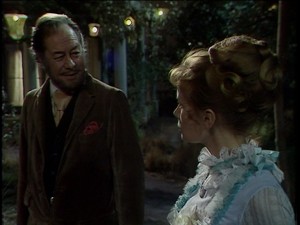
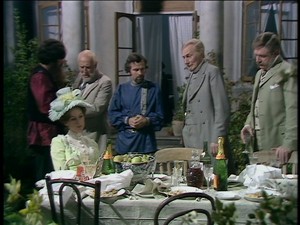
Jamie S. Rich is a novelist and comic book writer. He is best known for his collaborations with Joelle Jones, including the hardboiled crime comic book You Have Killed Me, the challenging romance 12 Reasons Why I Love Her, and the 2007 prose novel Have You Seen the Horizon Lately?, for which Jones did the cover. All three were published by Oni Press. His most recent projects include the futuristic romance A Boy and a Girl with Natalie Nourigat; Archer Coe and the Thousand Natural Shocks, a loopy crime tale drawn by Dan Christensen; and the horror miniseries Madame Frankenstein, a collaboration with Megan Levens. Follow Rich's blog at Confessions123.com.
|
| Popular Reviews |
| Sponsored Links |
|
|
| Sponsored Links |
|
|
| Release List | Reviews | Shop | Newsletter | Forum | DVD Giveaways | Blu-Ray | Advertise |
|
Copyright 2024 DVDTalk.com All Rights Reserved. Legal Info, Privacy Policy, Terms of Use,
Manage Preferences,
Your Privacy Choices | |||||||









